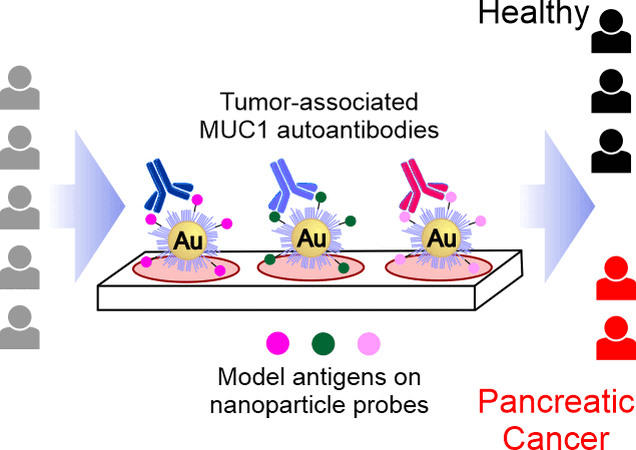Glycopeptide probes detect tumor-associated antibodies in blood samples
Pancreatic cancer is one of the most lethal forms of cancer, primarily because it is usually diagnosed very late. Current markers are too insensitive and unspecific for early detection screenings. In the journal Angewandte Chemie, a research team has now introduced a new method that could lead to a significantly more precise and reliable diagnosis. It is based on the selective detection of specific antibodies in blood samples.

© Wiley-VCH, re-use with credit to 'Angewandte Chemie' and a link to the original article.
Tumors produce certain proteins (tumor-associated antigens) that draw the attention of our constantly "patrolling" immune system and trigger an immune response. As a consequence, antibodies directed against the tumors (tumor-associated autoantibodies) are formed, circulating in the blood at very early stages of the disease-which makes them useful for early detection. An international team led by Roberto Fiammengo and Giovanni Malerba at the University of Verona (Italy) as well as Alfredo Martínez at the Center for Biomedical Research of La Rioja (Logroño, Spain) and Francisco Corzana at the Universidad de La Rioja , has now developed an approach to diagnostic testing for pancreatic cancer that is based on the detection of such special tumor-associated autoantibodies.
They chose to use autoantibodies directed against the tumor-associated form of mucin-1 (TA-MUC1). Mucin-1 is a heavily glycosylated protein (a protein with sugar components) that occurs, for example, in glandular tissue. In many types of tumors, including pancreatic cancer, it is found in significantly elevated concentrations. In addition, the pattern of glycosylation is different from the normal form. The team's goal was to detect autoantibodies that are directed specifically against TA-MUC1 and are a clear indicator of pancreatic cancer.
Based on structural analyses and computer simulations of known antibodies against TA-MUC1 (SM3 and 5E5), the team designed a collection of synthetic glycopeptides that mimic different segments (epitopes) of TA-MUC1. They also made unnatural modifications to increase the chances of identifying autoantibody subgroups indicative of the disease. The team immobilized these model antigens on gold nanoparticles achieving probes suitable for a serological assay (dot-blot assay). The diagnostic assay was validated with real samples from patients with pancreatic cancer and a healthy control group. Some of the nanoparticle probes could differentiate very well between samples from diseased and healthy individuals demonstrating they detected tumor associated autoantibodies. Notably, these specific autoantibodies displayed significantly better correct positive/false positive ratios than current clinical biomarkers for pancreatic cancer.
Probes with smaller glycopeptide antigens that correspond to only a single epitope, gave better results than larger probes that mimic multiple epitopes-an advantage for easier synthetic production. A short glycopeptide with an unnatural modification to its sugar component was found to be particularly effective for the detection of discriminating autoantibodies. This new structure-based approach could help in the selection of autoantibody subgroups with higher tumor specificity.
(3278 characters)
About the Author
Dr.Roberto Fiammengo is an Associate Professor at the University of Verona (Italy). His main expertise is the development of biofunctionalized nanomaterials for biomedical and diagnostic applications. Dr. Francisco Corzana is Professor at the University of La Rioja (Spain). He is an expert on the synthesis and conformational analysis of O-glycopeptides in solution and bound to antibodies or lectins. Dr. Fiammengo and Dr. Corzana share a common interest in understanding the response of the immune system towards glycosylated tumor antigens.
Copy free of charge-we would appreciate a transcript/link of your article. The original articles that our press releases are based on can be found in our online pressroom.






